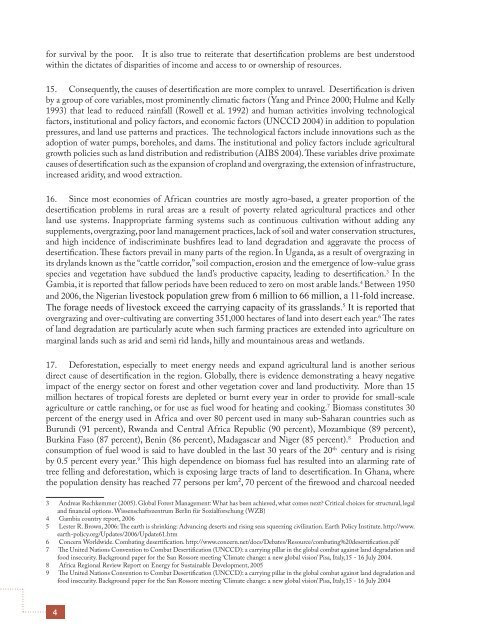drought desertification - United Nations Economic Commission for ...
drought desertification - United Nations Economic Commission for ...
drought desertification - United Nations Economic Commission for ...
You also want an ePaper? Increase the reach of your titles
YUMPU automatically turns print PDFs into web optimized ePapers that Google loves.
<strong>for</strong> survival by the poor. It is also true to reiterate that <strong>desertification</strong> problems are best understood<br />
within the dictates of disparities of income and access to or ownership of resources.<br />
15. Consequently, the causes of <strong>desertification</strong> are more complex to unravel. Desertification is driven<br />
by a group of core variables, most prominently climatic factors (Yang and Prince 2000; Hulme and Kelly<br />
1993) that lead to reduced rainfall (Rowell et al. 1992) and human activities involving technological<br />
factors, institutional and policy factors, and economic factors (UNCCD 2004) in addition to population<br />
pressures, and land use patterns and practices. The technological factors include innovations such as the<br />
adoption of water pumps, boreholes, and dams. The institutional and policy factors include agricultural<br />
growth policies such as land distribution and redistribution (AIBS 2004). These variables drive proximate<br />
causes of <strong>desertification</strong> such as the expansion of cropland and overgrazing, the extension of infrastructure,<br />
increased aridity, and wood extraction.<br />
16. Since most economies of African countries are mostly agro-based, a greater proportion of the<br />
<strong>desertification</strong> problems in rural areas are a result of poverty related agricultural practices and other<br />
land use systems. Inappropriate farming systems such as continuous cultivation without adding any<br />
supplements, overgrazing, poor land management practices, lack of soil and water conservation structures,<br />
and high incidence of indiscriminate bushfires lead to land degradation and aggravate the process of<br />
<strong>desertification</strong>. These factors prevail in many parts of the region. In Uganda, as a result of overgrazing in<br />
its drylands known as the “cattle corridor,” soil compaction, erosion and the emergence of low-value grass<br />
species and vegetation have subdued the land’s productive capacity, leading to <strong>desertification</strong>. 3 In the<br />
Gambia, it is reported that fallow periods have been reduced to zero on most arable lands. 4 Between 1950<br />
and 2006, the Nigerian livestock population grew from 6 million to 66 million, a 11-fold increase.<br />
The <strong>for</strong>age needs of livestock exceed the carrying capacity of its grasslands. 5 It is reported that<br />
overgrazing and over-cultivating are converting 351,000 hectares of land into desert each year. 6 The rates<br />
of land degradation are particularly acute when such farming practices are extended into agriculture on<br />
marginal lands such as arid and semi rid lands, hilly and mountainous areas and wetlands.<br />
17. De<strong>for</strong>estation, especially to meet energy needs and expand agricultural land is another serious<br />
direct cause of <strong>desertification</strong> in the region. Globally, there is evidence demonstrating a heavy negative<br />
impact of the energy sector on <strong>for</strong>est and other vegetation cover and land productivity. More than 15<br />
million hectares of tropical <strong>for</strong>ests are depleted or burnt every year in order to provide <strong>for</strong> small-scale<br />
agriculture or cattle ranching, or <strong>for</strong> use as fuel wood <strong>for</strong> heating and cooking. 7 Biomass constitutes 30<br />
percent of the energy used in Africa and over 80 percent used in many sub-Saharan countries such as<br />
Burundi (91 percent), Rwanda and Central Africa Republic (90 percent), Mozambique (89 percent),<br />
Burkina Faso (87 percent), Benin (86 percent), Madagascar and Niger (85 percent). 8 Production and<br />
consumption of fuel wood is said to have doubled in the last 30 years of the 20 th century and is rising<br />
by 0.5 percent every year. 9 This high dependence on biomass fuel has resulted into an alarming rate of<br />
tree felling and de<strong>for</strong>estation, which is exposing large tracts of land to <strong>desertification</strong>. In Ghana, where<br />
the population density has reached 77 persons per km², 70 percent of the firewood and charcoal needed<br />
3 Andreas Rechkemmer (2005). Global Forest Management: What has been achieved, what comes next? Critical choices <strong>for</strong> structural, legal<br />
and financial options. Wissenschaftszentrum Berlin für Sozial<strong>for</strong>schung (WZB)<br />
4 Gambia country report, 2006<br />
5 Lester R. Brown, 2006: The earth is shrinking: Advancing deserts and rising seas squeezing civilization. Earth Policy Institute. http://www.<br />
earth-policy.org/Updates/2006/Update61.htm<br />
6 Concern Worldwide. Combating <strong>desertification</strong>. http://www.concern.net/docs/Debates/Resource/combating%20<strong>desertification</strong>.pdf<br />
7 The <strong>United</strong> <strong>Nations</strong> Convention to Combat Desertification (UNCCD): a carrying pillar in the global combat against land degradation and<br />
food insecurity. Background paper <strong>for</strong> the San Rossore meeting ‘Climate change: a new global vision’ Pisa, Italy,15 - 16 July 2004.<br />
8 Africa Regional Review Report on Energy <strong>for</strong> Sustainable Development, 2005<br />
9 The <strong>United</strong> <strong>Nations</strong> Convention to Combat Desertification (UNCCD): a carrying pillar in the global combat against land degradation and<br />
food insecurity. Background paper <strong>for</strong> the San Rossore meeting ‘Climate change: a new global vision’ Pisa, Italy,15 - 16 July 2004<br />
4

















